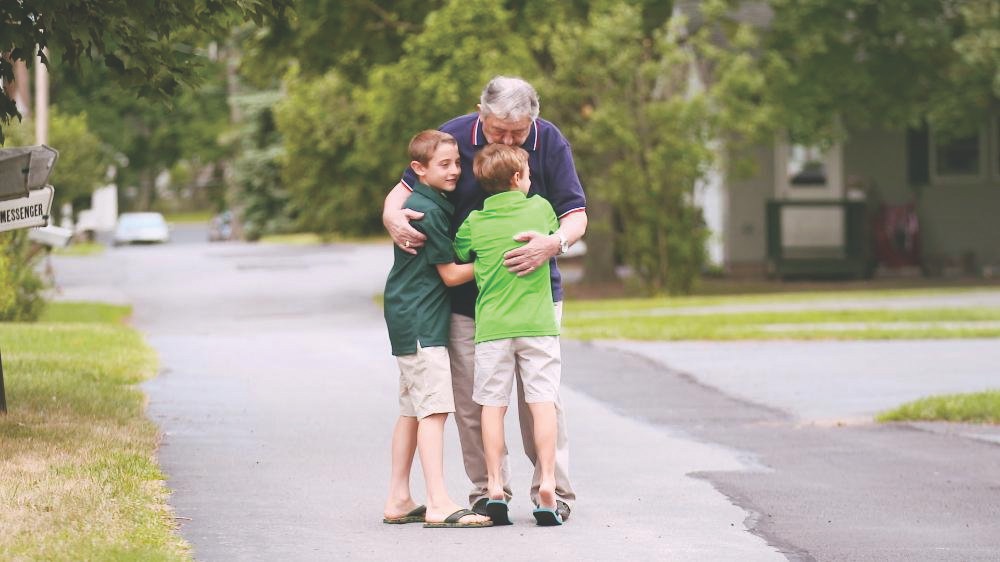 Holocaust survivor Jack Feldman and his great-grandsons. Images courtesy of HBO Pictures
Holocaust survivor Jack Feldman and his great-grandsons. Images courtesy of HBO Pictures In just 20 minutes, the documentary “The Number on Great-Grandpa’s Arm” covers much of recent Jewish history, told through the loving relationship between Jack Feldman and Elliott, his great-grandson.
Although separated by some 80 years in age and vastly different experiences, the two bond as close buddies as the youngster prompts the Holocaust survivor to tell the story of his life.
Both are now New York state residents, with Elliott living with his parents in Chappaqua, about 30 miles north of New York City, and Feldman some five hours drive away in Rochester.
At Feldman’s home, and in long walks along the banks of the Canandaigua Lake, Elliott asks first about the number A17606 permanently etched into his great-grandfather’s arm.
Through a combination of vivid recollections, archival footage and superb animation by artist Jack Scher, the film reconstructs a happy childhood in the Polish city of Sosnowiec, whose 28,000 Jews made up nearly a quarter of the population. Feldman skips over some of the grimmer details of his life, but he recounts the city’s conquest by the German army, his imprisonment in a concentration camp at 14, separation from his parents (whom he never saw again), liberation by Soviet troops and eventual immigration to the United States.
The Journal talked to Feldman, Elliott and Amy Schatz, the director of the documentary, which will premiere at 6 p.m. Jan. 27 on HBO. The date marks the liberation of the Auschwitz-Birkenau death camp in 1945 and is now commemorated annually as International Holocaust Remembrance Day.
“We need to make smart films for kids, which don’t talk down to them, even on difficult subjects.” — Amy Schatz
Feldman survived Auschwitz (partly by trading his Sunday ration of a few cigarettes for food), came to America in 1949 and changed his first name from Srulek to Jack. A few years later, he opened Jack’s Fish Market in Rochester.
The business thrived, despite one quirk. As one African-American customer testifies in the film, “Jack knew what hunger was, so he gave free fish to a customer too poor to pay.”
Schatz, a veteran documentary filmmaker, was attracted to directing the project, in collaboration with executive producer Sheila Nevins, because, she said, there isn’t enough material on the Holocaust suitable for children and their families. That means, Schatz said, that when these children become adults “they won’t be able to pass on the survivors’ stories to future generations.”
Her goal was to transmit Feldman’s experience “gently and with clarity,” and pointed notably to the love between Elliott and his “grandpoppy,” the boy’s endless curiosity, and his patience in dealing with Feldman’s hearing problems.

Schatz shot the film in three days, working closely with the Museum of Jewish Heritage in New York, which will include the film in its permanent collection, and drawing on the archives of the Steven Spielberg collection at the United States Holocaust Museum in Washington, D.C.
From the reactions of her own children, ages 13 and 14, Schatz concluded that “we need to make smart films for kids, which don’t talk down to them, even on difficult subjects. At the same time, I found that the Holocaust survivors themselves were delighted to talk to the youngsters.”
Elliott, now a 12-year-old sixth-grader, was 7 when his great-grandfather first took him to a Holocaust memorial event.
“At first, I didn’t understand what had happened,” Elliott said, but after five years of additional conversations with his beloved mentor, the boy realizes what he has gained through the instruction.
What he has learned and knows now, Elliott said, “makes me more appreciative of what I have in my daily life and more proud of my heritage and religion.”























 More news and opinions than at a Shabbat dinner, right in your inbox.
More news and opinions than at a Shabbat dinner, right in your inbox.